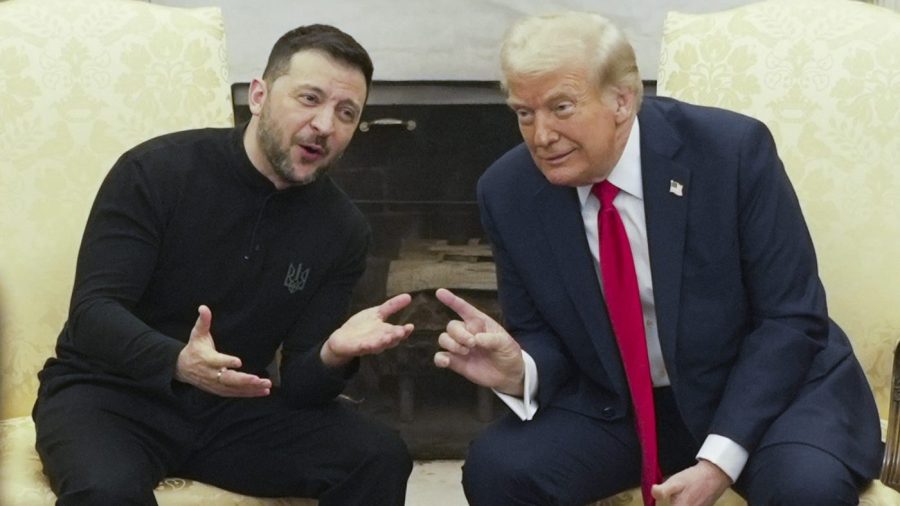
How does President Trump’s deal-making record with respect to the Russo-Ukrainian War stack up against that of Vladimir Putin and Volodymyr Zelensky?
One way to answer this question is to use Trump’s own criteria, as listed in the second chapter (“Trump Cards: The Elements of the Deal”) of his ghostwritten 1987 bestseller, “The Art of the Deal.”
Trump lists 11 elements, most of which are strikingly banal.
“Think big” is his first piece of obvious advice. “I like thinking big,” he writes. “I always have. To me it’s very simple: if you’re going to be thinking anyway, you might as well think big.”
Ending the war in 24 hours was thinking big. Focusing on a ceasefire that Putin openly rejects is not. In contrast to Trump, Putin and Zelensky both want to win. That’s thinking big. Give each of them a point, and zero to the small-thinking Trump.
The second element of the deal: “Protect the downside and the upside will take care of itself.” According to Trump, “I always go into the deal anticipating the worst. If you plan for the worst — if you can live with the worst — the good will always take care of itself.”
Unfortunately, Trump embarked on negotiations with Putin and Zelensky anticipating the best — a quick agreement. Putin and Zelensky knew it would be a slog and were prepared for it. They get a point apiece; Trump gets nothing.
“Maximize the options” is Trump’s third piece of advice. “I never get too attached to one deal or one approach,” he writes. “I keep a lot of balls in the air, because most deals fall out, no matter how promising they seem at first.”
To the contrary, Trump appears wedded to courting Putin, regardless of the Russian autocrat’s war crimes and unwillingness to close a deal, and to dissing Zelensky, regardless of the Ukrainian president’s willingness to compromise. Yet again, the sly Putin, who speaks out of both sides of his mouth, gets a point, as does Zelensky. Trump gets nothing.
Number four is “Know your market,” of which Trump writes: “I like to think that I have that instinct. That’s why I don’t hire a lot of number-crunchers, and I don’t trust fancy marketing surveys. I do my own surveys and draw my own conclusions.”
Indeed, Trump does, and his ignorance of Russia and Ukraine is shockingly obvious. Both Zelensky and Putin know what the war is about. They get a point, whereas Trump scores zero.
Number five is “Use your leverage.” “The worst thing you can possibly do in a deal is seem desperate to make it,” he writes. “That makes the other guy smell blood, and then you’re dead.”
No comment is necessary. A point to Putin, and none to Trump or Zelensky.
Number six, “Enhance your location,” is irrelevant, except to real-estate dealmakers.
But number seven is relevant: “Get the word out.”
“One thing I’ve learned about the press is that they’re always hungry for a good story, and the more sensational the better,” Trump’s book says. “The point is that if you are a little different, a little outrageous, or if you do things that are bold or controversial, the press is going to write about you.”
Trump, Putin and Zelensky get a point each.
But Trump reverts to loser status with number eight, “Fight back.” “In most cases I’m very easy to get along with,” he writes. “I’m very good to people who are good to me. But when people treat me badly or unfairly or try to take advantage of me, my general attitude, all my life, has been to fight back very hard.”
Trump has thus far refused to fight Putin, while continuing to fight Zelensky, even though he hasn’t treated the U.S. president badly or unfairly. So give Putin a point, and Trump and Zelensky nothing.
Number nine is hilarious: “Deliver the goods: You can’t con people, at least not for long. You can create excitement, you can do wonderful promotion and get all kinds of press, and you can throw in a little hyperbole. But if you don’t deliver the goods, people will eventually catch on.”
Thus far, Trump has delivered nothing regarding the war. Neither has Putin. In contrast, Zelensky has delivered Ukraine’s survival. He gets one point, while Trump and Putin get zero.
Number 10 is “Contain the costs. “I believe in spending what you have to,” he writes. “But I also believe in not spending more than you should.”
Trump’s advice is either screamingly obvious or nonsensical. No one gets any points.
The last element of the deal is downright obscene at a time of war. “Have fun: Money was never a big motivation for me, except as a way to keep score. The real excitement is playing the game.”
Aside from the fact that money is a huge motivation for Trump, he’s obviously having a ball as Ukrainians and Russians die. Both Putin and Zelensky know that war is no game. They get no points, while America’s merrymaker-in-chief gets one.
The final tally? Putin seven, Zelensky six and Trump two.
The master dealmaker appears to have forgotten how to make a deal, and the prospects for a ceasefire or peace between Russia and Ukraine are accordingly slim. And they will remain slim as long as Trump remains content with being a loser.
Alexander J. Motyl is a professor of political science at Rutgers University-Newark. A specialist on Ukraine, Russia and the USSR, and on nationalism, revolutions, empires and theory, he is the author of 10 books of nonfiction, as well as “Imperial Ends: The Decay, Collapse, and Revival of Empires” and “Why Empires Reemerge: Imperial Collapse and Imperial Revival in Comparative Perspective.”

